Music at Univ can be broadly divided into two categories; academic and practical. If you’re interested in studying music at Univ, then visit out Music Course page, if, however, you are wondering what practical music-making happens at Univ, then please read on…
There are a myriad of different aspects to Music at Univ, from open-mic nights in the Bar, to Bach cantatas in the Chapel. You don’t have to be reading the subject to participate in the enormous variety of music in College.
Director of Music
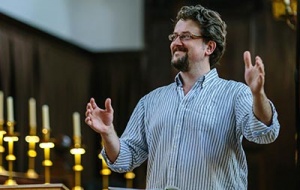 Univ’s Director of Music is Giles Underwood, a singer and teacher with a background steeped in the traditions of the highest quality choral and ensemble singing. He was a chorister at Westminster Abbey, an Academical Clerk (Choral Scholar) at Magdalen College, Oxford, and studied on the postgraduate and opera programmes at the Guildhall School of Music and Drama, where he also taught voice for a number of years. He now holds the post of Professor of Singing at The Royal Academy of Music in London.
Univ’s Director of Music is Giles Underwood, a singer and teacher with a background steeped in the traditions of the highest quality choral and ensemble singing. He was a chorister at Westminster Abbey, an Academical Clerk (Choral Scholar) at Magdalen College, Oxford, and studied on the postgraduate and opera programmes at the Guildhall School of Music and Drama, where he also taught voice for a number of years. He now holds the post of Professor of Singing at The Royal Academy of Music in London.
He has an active singing career, both as an ensemble singer, and as a soloist and opera singer.
He teaches singing to undergraduates from Magdalen, Christ Church, Merton and Queen’s. He runs workshops and master-classes with choirs and individuals all over the world; recently in Washington DC on the Chorworks Summer School and in residence at The College of New Jersey and for the Granada Festival. He taught singing at Selwyn College, Cambridge from 2005-14 and has been a Singing Teacher for the Rodolfus Foundation Choral Courses since 2001.
His recordings include Buxthude’s Membra Jesu Nostri with John Mark Ainsley and Robin Blaze, conducted by Daniel Hyde.
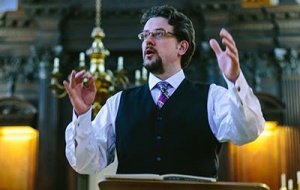 As Director of Music at Univ, Giles has responsibility for running the Chapel Choir and overseeing and encouraging extra-curricular music in College. He is the founder and director of The Martlet Ensemble and Martlet Voices, and chairs the panel for the Mendl-Schrama Prize in Music – details of which can be found here.
As Director of Music at Univ, Giles has responsibility for running the Chapel Choir and overseeing and encouraging extra-curricular music in College. He is the founder and director of The Martlet Ensemble and Martlet Voices, and chairs the panel for the Mendl-Schrama Prize in Music – details of which can be found here.
The Martlet Ensemble
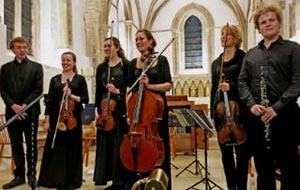 The Martlet Ensemble (TME) was created in 2014 with the intention of establishing Univ as a centre of musical excellence in Oxford. The Ensemble consists of internationally renowned musicians who come to Univ to perform and to coach students.
The Martlet Ensemble (TME) was created in 2014 with the intention of establishing Univ as a centre of musical excellence in Oxford. The Ensemble consists of internationally renowned musicians who come to Univ to perform and to coach students.
Its dual function is to provide not only professional music-making in College, but also tailor-made coaching and performing opportunities for Univ musicians. It has been proven that students who have reached a high standard on a musical instrument achieve better degrees due to the rigour of learning involved. We hope that the existence of TME will prove attractive to prospective students, as it represents a collaboration not offered by other colleges.
Each year, as the musicians in College change, so will the projects, thus tailoring the music studied and performed to suit our current musical community. Recent performances have included; Brahms’ Sextet, Mendelssohn’s Octet, Ravel’s Introduction and Allegro for Harp, Strings, Clarinet and Flute, Mozart’s Clarinet Quintet as well as a number of performances of various Bach Cantatas.
Martlet Voices
Martlet Voices, was formed in April 2017, as the vocal equivalent of the instrumental group, The Martlet Ensemble. Its purpose is to give student singers the opportunity to sing alongside professionals in a solo consort setting. Univ has a number of fine singers, and the experience of singing in a solo voice setting is quite different from that of singing in a choir, however small. The level of individual responsibility and commitment is something in which student singers rarely have the chance to participate, and the hope is that they will be able to use these new-found skills in all their musical endeavours in the future.
Martlet Voices has now staged a variety of different programmes. The first, ‘Contemporary Reflections and Prayers’, featured music by Britten, Stravinsky, Moeran, Rubbra, Howells, Barber and Philip Moore. The second project, ‘Monteverdi and his Contemporaries’, was a joint celebration of the 450th anniversary of Claudio Monteverdi’s birth and the finest work of the Italian playwright and poet, Giovanni Battista Guarini, Il Pastor Fido (The Faithful Shepherd). Other projects have been: ‘Songs of Love and Springtime’ featuring music from throughout the twentieth century and discovering just how far composers have come writing music which is purely driven by text; ‘Music from the Song of Songs’; ‘Songs on the Passing of Time’ and ‘Songs of Wintertime’.
Future programmes will include the phenomenal Le Lagrime di San Pietro, a setting by Lassus of twenty 7-part madrigals detailing the penitential journey of St Peter after denying Christ; an exploration of the European Madrigal, from Monteverdi to Schütz, Hassler to Hindemith; and a concert entitled ‘Songs in times of Winter and War’ with music by Richard Rodney Bennett, Roxanna Panufnik and Francis Poulenc.
More details in due course on our Events page.
Mendl-Schrama Prize in Music
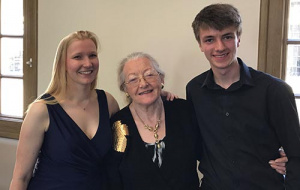 The Mendl-Schrama Prize in Music is Univ’s first music prize for undergraduate students. It is awarded annually and is worth £1000.
The Mendl-Schrama Prize in Music is Univ’s first music prize for undergraduate students. It is awarded annually and is worth £1000.
It is open to undergraduate singers and keyboard players of all types (piano, harpsichord, organ) and is awarded at the beginning of Hilary term each year. The objective of the prize is to provide meaningful financial support for outstanding students to pursue extra-curricular music study while at Univ.
Applicants must show that they have clear and well-considered plans to use the money toward furthering their musical endeavours; for example masterclasses, residential holiday courses, language courses or lessons/coaching with a particular teacher at a conservatoire.
Winners are required to furnish the Director of Music with a brief report on their use of the grant and the impact of such activities on their musical advancement. They are also required to present a recital which demonstrates the fruits of their labours. Past winners have been; 2014/15, Christopher Breeze (baritone) and Seung-Eon Yoo (piano); 2015/16, Isobel Rose (soprano); 2016/17, Oscar Hansen (baritone); 2017/18, Rebecca German (mezzo-soprano).
The Mendl-Schrama Prize was founded and endowed in 2014 by Mrs Heleen Mendl-Schrama, widow of His Honour James H E Mendl (1948, Law).
Summary of entry requirements:
- Application must be in writing by the end of 4th week, Michaelmas term, giving an outline plan for the use of the prize money
- Auditions will be held in the first 2 weeks of the following Hilary term
- Candidates must prepare 2 contrasting pieces, to last not more than 10 minutes
- All undergraduate singers, keyboard players and duet partnerships between singers and accompanists may apply from across the University
- Previous winners are not eligible to reapply
College Music Society (UCMS)
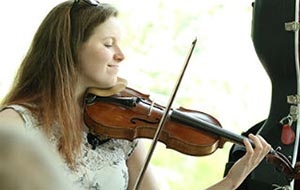 The University College Music Society (UCMS), founded more than 80 years ago, is a student-led society responsible for putting on concerts and other events in College throughout the year.
The University College Music Society (UCMS), founded more than 80 years ago, is a student-led society responsible for putting on concerts and other events in College throughout the year.
Events are arranged by UCMS to accommodate all musical tastes, including Open Mic nights in the College Bar, planned to showcase the diverse talent among the student body. The College Orchestra, run by the student members of UCMS meets regularly to rehearse and perform.
The College has a variety of performing spaces which can be used to suit the type and scale of the music being performed. The intimate setting of the Master’s Lodgings lends itself to small-scale chamber or solo concerts, whilst the Hall can be used for recitals and larger groups. The Chapel is ideal for choirs and medium-sized chamber orchestras, and has two organs – you can read more about them here.
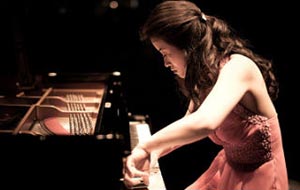
Chisato Kusunoki by Patrick Poh
UCMS holds an annual dinner at which distinguished music industry figures are invited to speak; these have included Paul Gambaccini (1970, PPE) and Dougie Scarfe, Chief Executive of Bournemouth Symphony Orchestra. It also has a fruitful relationship with the Merton College Music Society; the two colleges frequently hold larger-scale events featuring The Kodaly Choir and Fidelio Orchestra, which have both been run by Univ musicians in recent years.
Visiting professional musicians, including Old Members, give concerts in College on a regular basis. The concert pianist, Chisato Kusunoki (1998), and the organist, William Whitehead (1990) have both been recent visitors. Other guests have included the cellist, Richard Tunnicliffe who performed the complete Bach Cello Suites in 2016, and the pianists Julian Jacobson and Mariko Brown, who gave a recital of piano duet music in 2015.
Musicians in Univ are also invited to perform at College occasions, such as weddings, Alumni events and Gaudys.
The Chapel Choir
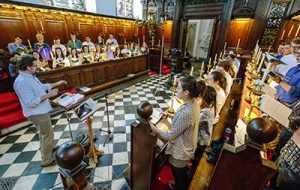 The Chapel Choir at Univ is as central to the life of the College, as the Chapel itself is physically central to the fabric of the College. The choir consists of Choral Scholars (members of Univ), Choral Bursars (non-members of Univ) and volunteers. It is one of the very few choirs to offer free singing lessons to all its members. Members of the choir are also offered free formal hall on a Sunday evening. New members are welcome to join at any point in the academic year, and should contact the Director of Music to arrange an audition via email – E: Giles.Underwood@univ.ox.ac.uk
The Chapel Choir at Univ is as central to the life of the College, as the Chapel itself is physically central to the fabric of the College. The choir consists of Choral Scholars (members of Univ), Choral Bursars (non-members of Univ) and volunteers. It is one of the very few choirs to offer free singing lessons to all its members. Members of the choir are also offered free formal hall on a Sunday evening. New members are welcome to join at any point in the academic year, and should contact the Director of Music to arrange an audition via email – E: Giles.Underwood@univ.ox.ac.uk
There is one main sung service a week: Choral Evensong on Sundays at 5.45pm. The choir also sings for occasional special services. It has two short rehearsals during the week: on Wednesday and Friday evenings (5.15-6.20pm). There is also a rehearsal on a Sunday afternoon (3.45-5.15pm), followed by tea and cake before the service at 5.45pm.
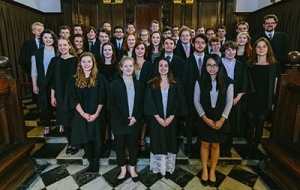 Members of the choir enjoy an active social life and there are opportunities to sing outside Oxford. They have been on tour to Florence (2017), Prague (2016), Ireland (2015), Luxembourg (2013) and Venice (2011). In recent years they have also sung at Canterbury, Southwark and Birmingham Cathedrals, and at The Royal Naval Chapel in Greenwich.
Members of the choir enjoy an active social life and there are opportunities to sing outside Oxford. They have been on tour to Florence (2017), Prague (2016), Ireland (2015), Luxembourg (2013) and Venice (2011). In recent years they have also sung at Canterbury, Southwark and Birmingham Cathedrals, and at The Royal Naval Chapel in Greenwich.
Listen below to the Choir singing Steal Away by Michael Tippett.
Chapel Choir Recordings
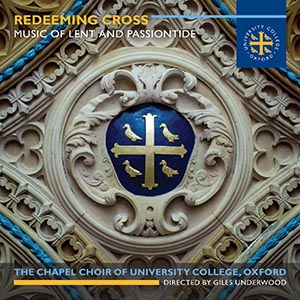 Redeeming Cross
Redeeming Cross
Univ is delighted to announce the release of its newest CD, Redeeming Cross: Music of Lent and Passiontide.
This rich and varied recording features some of the wide selection of music sung in the College Chapel during Lent and Passiontide. Composers such as Bach and Purcell are represented, as well as less well-known writers like Maurice Greene and Thomas Morley. The centrepiece of the disc is the wonderful setting of The Lamentation by Edward Bairstow, a heart-rending cri-de-coeur which uses the fall of Jerusalem as a metaphor for the persecution and death of Christ. Also included are some choir favourites like Drop, drop, slow tears by Orlando Gibbons and Stanford’s Beati quorum via, and the rousing, unaccompanied eight-part Nunc dimittis by Gustav Holst is offset by the plaintive, opening movement of Herbert Howells’ Requiem.
The Chapel Choir is conducted by Director of Music, Giles Underwood, and the organ is played by organ scholars Alice Habisreutinger and Stella Kremer.
Redeeming Cross is available from the Lodge priced at £10, and postal enquiries should be made through the Development Office -E: development@univ.ox.ac.uk. (Please put Choir CD in the subject line.)
This disc is the second in a series marking the various seasons of the church year. If you would like to contribute directly to the costs of making these CDs, then please contact the Development Office.
Listen to track 2, Beati Quorum Via here:
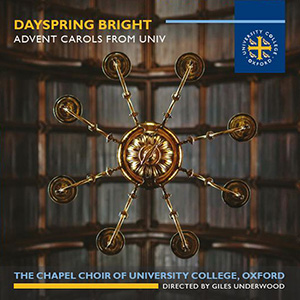 Dayspring Bright
Dayspring Bright
Dayspring Bright is a collection of music specific to the Advent season, featuring carols which form the musical backbone of the yearly Advent Carol services at Univ. The disc includes old favourites like In the Bleak Midwinter, O Come, O Come Emmanuel and Benjamin Britten’s A Hymn to the Virgin, as well as some more modern carols by composers such as Sally Beamish and Alexander Campkin. We are also delighted to have been able to record a carol by old member, Jonathan Lane (1977) – a setting of the mediaeval text, There is no Rose of Such Virtue.
The Chapel Choir is directed by Giles Underwood and the recordings feature organists Christopher Breeze, Alice Habisreutinger and Stella Kremer.
Dayspring Bright marks the beginning of a recording project highlighting the Chapel Choir’s singing of seasonal music. The next disc will contain music for Lent and is planned for release in 2018. If you would like to contribute to the costs of making our next CD, then please contact the Development Office – E: Development@univ.ox.ac.uk
Priced at £10, Dayspring Bright is available for purchase at the Lodge.
Listen to track 14, There Is No Rose here:
Univ Community Choir
The Community Choir at Univ will again be led by Carys Lane, alongside Sarah Chapman (4th year Chemist). The Choir had a really good start last Michaelmas before being shut down like everything else because of Covid.
Carys says, “Our aim is to run a choir which embraces the whole community of the College and welcomes anyone who thinks they would like to sing with others. It will investigate a wide range of music, pop to folk, jazz to world music. All that you need to bring with you is the wish to sing and to be open to trying the new.”
FAQs
Do I need to be able to read music?
No – generally speaking we will learn by ear. For those who think they learn better with music, there will be scores available.
Do I need previous choral experience?
No – if this is entirely new to you, you are most welcome. If you have sung in choirs and wish to maintain or rekindle your hobby, then we welcome your experience.
I already sing in Chapel Choir or another choir in the city – can I join the Community Choir?
Yes! – The repertoire will be totally different to Chapel Choir and therefore may give you another perspective.
What is the commitment level?
We will meet once a week on a Tuesday evening for one hour between 7-8pm.
Any choir in order to be successful requires people to commit to being there, so regular attendance will be encouraged, but we do understand that people lead busy lives.
I am a nervous performer – do I have to do concerts?
No – The aim in our first term is to meet and experiment – learn some songs and prepare some Christmas arrangements for an outside carolling event in 8th week.
Anyone who would prefer not to perform will not be forced to, but our aim is to build confidence so people might feel comfortable to meet the challenge.
Singing should be a joyous activity and the aim is enjoyment through collective endevour.
If you have any other questions regarding the choir please feel free to contact Carys on carys.lane@btinternet.com
Carys Lane
Carys was educated at the Purcell School and then at the Royal Academy of Music, initially studying the flute, but changing course to singing at postgraduate level.
Having graduated, her early career was spent specialising in ensemble singing. She recorded and performed with nearly all the major professional ensembles and choirs in Britain including The Tallis Scholars, The Sixteen, I Fagiolini, The Cardinall’s Musick and The Gabrieli Consort.
Latterly, Carys has changed the focus of her career to coaching and teaching. She is based in Oxford and teaches choral scholars at Magdalen, Merton and Queen’s colleges as well as offering lessons and classes across the university. She has held coaching residencies at the university of Perth Australia, the University of Vermont, and the Dartington Summer Schools. She teaches for the Rodolfus Foundation Choral Courses and for the National Youth Choirs of Great Britain.
Her most recent projects in Oxford have been working with the new Merton Girls Choir, which has 24 girls between 9 and 16, and working with The Martlet Ensemble, a professional small vocal ensemble whose remit is to work with students at University College, offering coaching and performing with them. She is also the Vocal Consultant for the Oxford Bach Choir.
Music Facilities
The College is lucky to have a number of spaces with pianos and good quality electronic pianos for students to practice, both on the main site and in “Stavertonia”, North Oxford, part of Univ’s offsite accommodation.
Facilities include:
- The James Ray Music Suite, in 10 Merton Street, with 2 bookable music rooms – Room 1 has a Challen Baby Grand piano; Room 2 has an electric piano, electronic drum kit, amps and other keyboards. These rooms are bookable through the room booking system.
- Grand pianos in the Hall and in the Masters Lodgings
- Good quality pianos or electric pianos in the rooms of music students, organ scholars and some choral scholars. This includes offsite rooms in Stavertonia and Iffley Road. Please contact the DoM to discuss being added to the piano ballot if you would like a piano in your room.
- The Chapel has a two manual Walker organ (completely refurbished in 2016) and a transposable Collins box organ. It is also available as a rehearsal and performance space
- 10 Merton Street Lecture Theatre – this room has a Bösendorfer Baby Grand piano and is bookable via the Domestic Bursary
- The Goodhart Seminar Room is also bookable and houses a good quality Yamaha electric piano
- Piano in Redcliffe-Maud common room
Scholarships and Bursaries
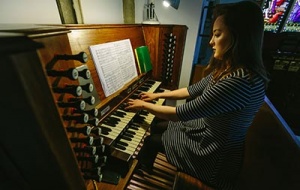 Organ Scholarships
Organ Scholarships
Organ Scholars at Univ are at the heart of our thriving musical community. As well as having an essential role with the Chapel Choir, they also find themselves involved with music-making elsewhere in College, primarily through The University College Music Society (UCMS). In the wider University, Univ Organ Scholars often play an active role in orchestras and chamber ensembles.
There are usually at least two Organ Scholars in residence at any one time, so the college will consider applicants for an Organ Scholarship in each academic year. Further details of this process are available in the University prospectus. Some of our recent applicants have had a gap-year, perhaps in a cathedral or teaching music at a school, but others have come straight from school. We welcome applications from candidates in either position. Organ Scholars are not required to be studying for a music degree. Prospective candidates should email the Director of Music or the Chaplain for details, or see the Music Faculty webpages.
Organ Scholars are each awarded an annual stipend of £500, and, in addition, are offered organ, conducting and singing lessons at the College’s expense, and are permitted to wear a Scholar’s Gown.
Each Organ Scholar may have either a piano or a keyboard in his or her room. They also have access to the grand piano in the College Hall, a fine Peter Collins box organ, and the newly refurbished Walker organ in the Chapel which is available for practice each day and evening. The Organ Scholars are answerable to the Director of Music (who has primary responsibility for their training and support) and the Chaplain. Their duties include accompanying the choir, playing before and after services, and conducting some rehearsals and services. When not playing, they are expected to sing in the choir, thus giving them a fuller experience of being on both sides of the conductor’s stand. As there is only one sung service each week, the time-commitment expected of an Organ Scholar is relatively modest. The repertoire is wide-ranging, and Organ Scholars are encouraged to develop their own interests. There are also opportunities to involve other instrumentalists in chapel services, and to organise concerts and tours. Find our more about the Chapel Choir above.
Former Organ Scholars now working as professional musicians include David Todd (2010), Esther Jones (1996), Matthew Berry (1995), William Whitehead (1990), and Simon Toyne (1988).
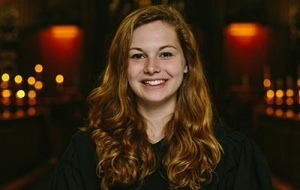 Choral Scholarships and Bursaries
Choral Scholarships and Bursaries
In recognition of the stature of the choir and its central place in the life of the College, Univ elects a number of Choral Scholars each year. There are two opportunities to apply: first applicants may apply for choral scholarships before they apply for a place at the College – further details of this process (which takes place in the September prior to the admissions process in December) are available here.
Second, all students at Univ have an opportunity to apply for choral scholarships once they have already taken up their place; this process takes place in Hilary (spring) Term each year.
 Choral Scholarships are awarded to Sopranos, Altos (male and female), Tenors and Basses, but there is no strict quota for any one part. Choral Scholars are able to read any subject offered by the College. They are each awarded an annual scholarship of £150 and are permitted to wear a Scholar’s Gown. It is expected that Choral Scholars will take a central role in the life of the choir, and that they will also be active in the wider musical life of the College.
Choral Scholarships are awarded to Sopranos, Altos (male and female), Tenors and Basses, but there is no strict quota for any one part. Choral Scholars are able to read any subject offered by the College. They are each awarded an annual scholarship of £150 and are permitted to wear a Scholar’s Gown. It is expected that Choral Scholars will take a central role in the life of the choir, and that they will also be active in the wider musical life of the College.
Choral Bursaries are awarded to non-members of Univ who are already volunteers in the choir. They are also worth £150 per annum and are intended to reward members of the choir from other colleges who have shown continuing commitment. Choral Bursars enjoy the same privileges as Choral Scholars.
Internal Instrumental Scholarships
Instrumental scholarships worth £100 are awarded on a yearly basis in Hilary term of each academic year. Candidates are invited to apply and are required to audition with one or more pieces of music no longer than 10 minutes. Awards will be made on the basis of this audition, and in recognition of contribution to the musical life of the college.
Candidates should include in their written application details of their instrument and music to be played, and a brief description of the applicant’s involvement with, and contribution to music at Univ. Applicants must provide their own accompanist if needed. Current award holders who are not in their final year may reapply.
